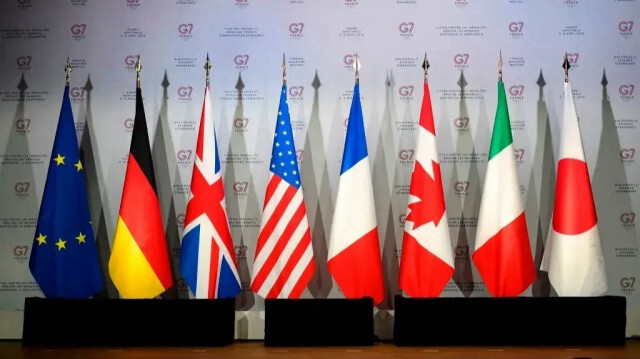
Dangerous cycle of attacks, retaliation in no one's interest, says statement
The Group of Seven (G7) leaders urged regional players in the Middle East to "act responsible" on Thursday amid rising tensions after Iran attacked Israel with ballistic missiles earlier this week.
The leaders warned of a "dangerous cycle of attacks and retaliation risks fuelling uncontrollable escalation in the Middle East, which is in no one's interest."
"Therefore, we call on all regional players to act responsibly and with restraint. We encourage all parties to engage constructively to de-escalate the current tensions. International humanitarian law must be respected," they said in a joint statement.
They also voiced concern about the "deteriorating situation" in the Middle East and condemned "in the strongest terms" Iran's attack against Israel, which they said constitutes a serious threat to regional stability.
The leaders reiterated their commitment to the security of Israel and said Tehran is "seriously destabilizing actions throughout the Middle East through terrorist proxies and armed groups—including the Houthis, Hezbollah, and Hamas— as well as Iran-aligned militia groups in Iraq, must stop.
"Yesterday we discussed coordinated efforts and actions to avoid escalation in the area," according to the statement.
- Gaza and Lebanon
They also reiterated their call for an immediate cease-fire in the Gaza Strip, the release of all hostages, increased humanitarian assistance and an end to the conflict.
"The situation in Gaza is catastrophic, and tens of thousands of innocent lives have been lost. We reiterate the absolute need for the civilian population to be protected and that there must be full, rapid, safe, and unhindered humanitarian access, as a matter of absolute priority," said the statement.
"We will continue working to set the conditions for a durable peace, leading to a two State solution, where Israel and Palestine coexist side-by-side in peace, with security for both," it added.
The G7 leaders are concerned about the situation in Lebanon and called for a cessation of hostilities as soon as possible to create space for a diplomatic solution along the Blue Line, consistent with UN Security Council Resolution 1701 that was adopted in August 2006. It demands a full cessation of hostilities between Lebanon and Israel and the creation of a zone between the Blue Line and the Litani River, free of armed groups except for the Lebanese Armed Forces and UNIFIL.
"This is the only path to durably de-escalate tensions, stabilize the Israel-Lebanon border, fully restore the sovereignty, territorial integrity and stability of Lebanon, and return displaced citizens to their homes with safety and security on both sides," it said.
"We urge all actors to protect civilian populations. We are committed to providing humanitarian assistance to address the urgent needs of civilians in Lebanon," it added.
The leaders believe the UN is important in resolving armed conflict and mitigating the humanitarian impact in the Middle East.
"In this regard, we acknowledge the role of the United Nations Interim Force in Lebanon (UNIFIL) to restore peace and security. We are committed to reinforce our support to the mission, pursuant to applicable UN resolutions," it said.

